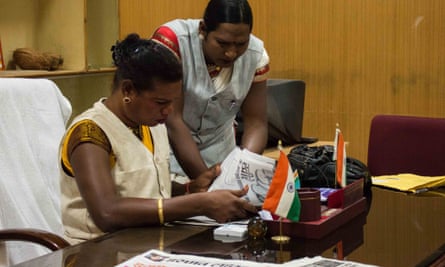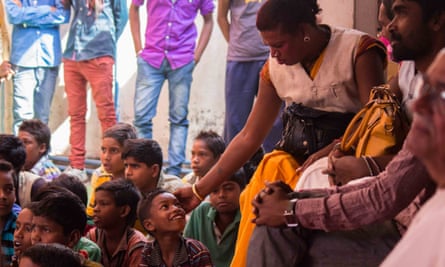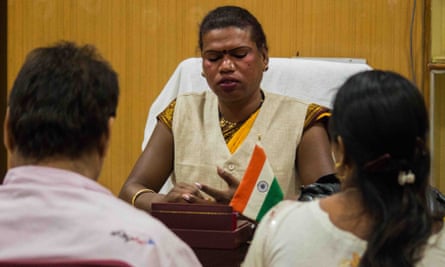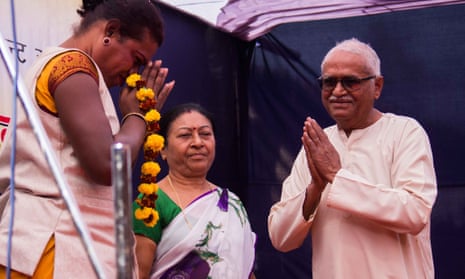Dayanand Anglo Vedic Convent School is normally a nondescript institution, hidden in the labyrinthine alleys of Chandmari, Chhattisgarh. But last month the school’s courtyard was transformed with a bright, multi-coloured marquee, and the students were whispering excitably.
When the special guest finally arrived, her presence was imposing. Six feet tall and clad in a stiff Nehru jacket over a yellow silk sari, Madhu Kinnar brought a grand, ceremonious air. The school’s director introduced her to the students, honoured her with garlands and then ushered her to a set of hurriedly placed plastic chairs to observe the school dance competition. Every few minutes, a young boy or girl would turn around to stare at her in fascination.
It’s clear why: Madhu is a hijra (or kinnar as they’re known in parts of Chhattisgarh and north India), a transgender woman. The hijra community is largely discriminated against throughout the country. In Raigarh, however, Madhu occupies celebrity status (and like Madonna, goes by one name). On 5 January, the voters of Raigarh – population 137,097 – elected the 35-year-old Madhu as India’s only transgender mayor.
Most hijras are transgender women born male but who identify as women or “in-between”. Usually shunned by their families or mistaken for eunuchs, transgender Indians often join the hijra community – a relatively organised, hierarchical system in which new members follow their reet (tradition) of becoming a chela (disciple) to an elder hijra guru to learn the ways of navigating society on the fringes. These customs include begging for alms and singing and dancing at weddings and births for luck.
Only a year ago, Madhu was singing and dancing on the streets of Raigarh as a means of earning her living, a habitual form of livelihood among hijra communities across India. It was on those streets that she became acutely aware of what she still considers her city’s biggest urban problem: sanitation.

“There were no proper sidewalks,” she recalls . “The alleys were dirty and piled high with garbage. Poor people, abandoned in their old age, slept in the streets with nothing to keep them warm. We decided to do something – by running for this election.”
The initial signs were not encouraging. Not only did Madhu have no particular qualifications or experience, but India’s two previous transgender municipal leaders – Kamla Jaan of Katni, elected in 1999, and Kamala Kinnar of Sagar in 2009 – were pejoratively termed “eunuchs” by the media and, within two years, asked to step down by their town courts who declared their candidacy “null and void” for contesting in the female category.
But a couple of things were in Madhu’s favour. First, last April, the Supreme Court of India declared the transgender community as a legal third gender, granting them minority rights and privileges to education, employment and health benefits.
Second, and perhaps Madhu’s biggest advantage, was that she decided to run as an independent candidate. Like most of India, Raigarh’s seats of power have chiefly been controlled by two main political parties – the Bhartiya Janata Party (BJP) and the Indian National Congress Party – both of which have earned the Raigarh public’s ire for their inability to achieve progress.
“Neither BJP or Congress have managed to get any work done in Raigarh in the last 15 years,” said Ramesh Singh, a party aide in Madhu’s team.
Singh, originally a member of the local Congress party, first noticed Madhu when she was campaigning door-to-door with some of her kinnar brethren. He resigned from his party to join her. In fact, most of the young men in Madhu’s camp are dissatisfied former members of Congress or the BJP who’ve since defected.
When Madhu defeated the BJP’s Mahaveer Guruji by 4,537 votes, a Congress party member snidely called it the “BJP’s loss, not Madhu’s win”. Madhu herself was unperturbed. She says the people of Raigarh were just happy to see her come forward.
“I was born in this city and almost everyone here knows me,” she says.
Born Naresh Chauhan, she dropped out of school in her mid-teens and left her family to join the local transgender community. Calling herself “Madhu” – the last name “Kinnar” derives from her community – was a step in disassociating herself from her given male name. As expected, she faced prejudice. “We’ve been made fun of, bullied and called names because we’re nothing more than kinnar to them,” she says. “If we danced somewhere, people thought we were bad luck.”

She expected a similar reaction after gaining public office. “I was apprehensive at first,” she says of her inauguration day. “I had never appeared before such a huge crowd – all those powerful councillors, officers, and deputies.”
But she says she didn’t experience any problems, and believes she has seen a change in behaviour across Raigarh, with everyday citizens treating not only her but her fellow kinnars with more respect, calling her Mausi (“aunty”) or Didi (“sister”). She also quickly made a name for herself as a down-to-earth politician, riding to city hall on a borrowed scooter or by rickshaw, or getting a lift from anyone willing to give one. (She did, however, ask for a bodyguard, just in case.)
That down-to-earth approach is literally evident in her daily management of local affairs. Every morning at 7am, Madhu and a small team do the rounds of the local wards to tackle her main foe: sanitation. She spends much of her time harassing city workers to fix clogged wells, pipes and unhygienic gutters. Problems like these tend to remain ignored in India if someone higher up isn’t pressing the issue, and Madhu’s politically savvy staff – familiar with the years of bad governance – have insisted on overseeing it themselves.
She has also trained her gaze on the Sanjay Complex vegetable market, which supplies produce to all of Raigarh’s 48 wards. “The conditions of this market are really unhygienic, and the traffic makes things worse,” she says. “We want to clean everything first, give it a structure, each vendor a proper stall, and take care of all the drainage problems.”
Though cleanliness and hygiene are the cornerstones of Madhu’s agenda, she is also looking into some of her constituents’ suggestions about cleaning and filling up some of the lakes and ponds that have fallen dry, and “creating gardens or small park spaces for old people to walk and children to play.”
In reality, Raigarh has bigger hygiene problems than dirty ponds. The district is a major coal mining centre, and home to Jindal Steel and Power Ltd, one of the biggest industrial firms in India. Trucks pass through Raigarh all the time, polluting it with coal dust that has plagued the city’s inhabitants for decades. Madhu’s solution smacks of nimbyism: “We want to reroute the truck traffic to the outer roads of the city, so that Raigarh’s citizens are not affected by the powder and dust flying off the trucks.”

Madhu – who has never left Raigarh – also seems sanguine about the status of the transgender community in general. She says she’s not looking to make any big efforts to improve their impoverished lifestyle. “Our true roots lie in this tradition of naach-gaana (song and dance), not politics,” she said. “But it was something carried on mostly by our elders, our gurus. For the younger, educated kinnars, I wish for them to be a part of society and find jobs – but only if they desire it.” (Madhu’s personal assistant Kunti is a kinnar too.)
In general, she paints a rose-tinted picture of the place of transgender Indians in the city. “I don’t think there’s any discrimination [in Raigarh] any more. Sab mit gaya hai [It has all vanished].”
Given the circumstances that the transgender community in India continues to face, Madhu’s blithe declaration is rather a surprise. Historically, India’s “third sex” has been excluded from all social, cultural, political and economic spaces, leaving them vulnerable to physical and sexual violence, and poverty. In 1871, the British Raj enacted the Criminal Tribes Act, under which certain tribes and communities were considered criminal by birth – including “eunuchs” or those who “dressed or ornamented like a woman in a public street”. Only in 1952, five years after independence, did prime minister Jawaharlal Nehru repeal the act, calling it a “blot on the law book of free India”. Although India’s transgender citizens finally won suffrage in 1994, they had to wait until 2012 for the Election Commission of India to add a new category to the electoral roll, “Other” (activists have demanded it be changed to “Transgender”; the Commission has so far refused). As of 2014, only 28,314 voters were registered as “Other” – a far cry from the 2011 census count of 490,000 transgender Indians.
More broadly, Indians are often ignorant about the nuances of gender identity and sexual orientation, mistaking all transgender women for hijras. According to a UN Development Programme report in 2010, HIV programmes in India until recently grouped all transgender women into the category “Men who have sex with men”. There’s a high prevalence of HIV and sexually transmitted diseases among gay men and hijra alike, and almost half report being forced into prostitution. Many more turn to begging.
Madhu claims Raigarh has transcended all this. She points out that she is also a member of the Dalit (“Untouchables”) caste, but says she doesn’t give much weight to either label, and considers her victory a matter of “luck and fate”: “I don’t think the Supreme Court decision had anything to do with my winning. It was God’s grace and the love of my people.”
As she tried to quietly slip away from the school dance, her departure predictably turned into a fanfare. Some people came forward to touch her feet and seek her blessing, others requested photos. In India, touching an elder’s feet is a sign of respect, but more so among hijras: most Indian still believe in the superstition that their blessings or curses can come true. Perhaps a hijra politician is not such a wild idea after all.

Comments (…)
Sign in or create your Guardian account to join the discussion